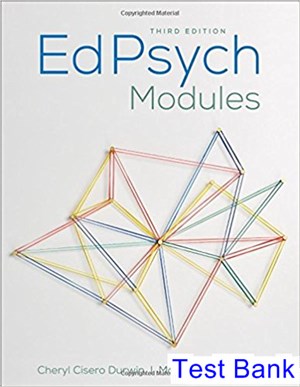EdPsych Modules 3rd Edition Durwin Test Bank

Product details:
- ISBN-10 : 9781506310756
- ISBN-13 : 978-1506310756
- Author: Cheryl Cisero Durwin
Now with SAGE Publications, Cheryl Cisero Durwin and Marla Reese-Weber’s EdPsych Modules uses an innovative implementation of case studies and a modular format to address the challenge of effectively connecting theory and research to practice. Each module is a succinct, stand-alone topic that represents every subject found in traditional chapter texts and can be used in any order for maximum flexibility in organizing your course. Each of the book’s eight units of modules begins with a set of four case studies–early childhood, elementary, middle school, and secondary–and ends with “Assess” and “Reflect and Evaluate” questions and activities to encourage comprehension and application of the research and theories presented. The case approach and the extensive pedagogy that support it allows students to constantly see the applications of the theories and research that they are studying in the text.
Table contents:
INTRODUCTION
MODULE 1: USING SCIENCE TO INFORM CLASSROOM PRACTICES
Educational Psychology: A Resource for Teachers
Educational Psychology: The Science
Educational Psychology: Classroom Practices
Summary
Key Concepts
Case Study: Reflect and Evaluate
UNIT 1: PERSONAL DEVELOPMENT
MODULE 2: CONTEXTS OF DEVELOPMENT
Bronfenbrenner’s Bioecological Theory
Family Context
Peer Context
Broader Contexts
Summary
Key Concepts
Case Studies: Reflect and Evaluate
MODULE 3: SOCIAL-EMOTIONAL DEVELOPMENT
Erikson’s Psychosocial Theory
Aspects of Identity
Understanding the Self
Social Competence
Applications: Fostering Social Competence
Summary
Key Concepts
Case Studies: Reflect and Evaluate
MODULE 4: MORAL DEVELOPMENT
Cognitive-Developmental Moral Reasoning
Prosocial Behavior
Aggressive Behavior
Applications: Advancing Moral Development
Summary
Key Concepts
Case Studies: Reflect and Evaluate
UNIT 2: THE DEVELOPING LEARNER
MODULE 5: BRAIN DEVELOPMENT
Influence of Neuroscience on Education
Neuroscience 101
Brain Mechanisms During Learning
Applications: How Neuroscience Informs Best Practices
Summary
Key Concepts
Case Studies: Reflect and Evaluate
MODULE 6: COGNITIVE DEVELOPMENT
Constructivist Theories of Cognitive Development
Issues in Cognitive Development: Piaget and Vygotsky
Applications: Constructivist Principles for Effective Teaching
Summary
Key Concepts
Case Studies: Reflect and Evaluate
MODULE 7: LANGUAGE DEVELOPMENT
Understanding Language Acquisition
Development of Language Skills
Applications: Encouraging Language Development in the Classroom
Summary
Key Concepts
Case Studies: Reflect and Evaluate
UNIT 3: LEARNING THEORIES
MODULE 8: BEHAVIORAL LEARNING THEORIES
Assumptions of Behavioral Learning Theories
Classical Conditioning
Operant Conditioning
Applications: Applied Behavior Analysis
Summary
Key Concepts
Case Studies: Reflect and Evaluate
MODULE 9: SOCIAL COGNITIVE THEORY
Assumptions of Social Cognitive Theory
Observational Learning
Personal Factors in Learning
Applications: Improving Students’ Self-Efficacy and Self-Regulation
Summary
Key Concepts
Case Studies: Reflect and Evaluate
MODULE 10: INFORMATION PROCESSING
Assumptions of the Information Processing Approach
Perception and Attention
Memory
Applications: Teaching Effective Processing
Summary
Key Concepts
Case Studies: Reflect and Evaluate
UNIT 4: COGNITIVE PROCESSES
MODULE 11: METACOGNITION
What Is Metacognition and Why Is It Important?
Special Cases of Metacognition
Factors Affecting the Development and Use of Metacognition
Applications: Learning Strategies
Summary
Key Concepts
Case Studies: Reflect and Evaluate
MODULE 12: TRANSFER OF SKILLS AND KNOWLEDGE
What Is Transfer and Why Is It Important?
Do We Readily Transfer What We Learn?
Applications: How to Facilitate Transfer
Summary
Key Concepts
Case Studies: Reflect and Evaluate
MODULE 13: HIGHER ORDER THINKING
What Is Higher Order Thinking and Why Is It Important?
Critical Thinking
Applications: Fostering Critical Thinking
Problem Solving
Applications: Fostering Problem-Solving Strategies
Creativity
Applications: Fostering Creativity
Summary
Key Concepts
Case Studies: Reflect and Evaluate
UNIT 5: MOTIVATION
MODULE 14: BEHAVIORAL THEORY
A Developmental View of Motivation
Rewarding Students for Learning
Applications: Using Rewards Effectively
Praising Students for Learning
Applications: Using Praise Effectively
When the Reward Is the Activity Itself
Applications: Creating an Intrinsically Motivating Learning Environment
Summary
Key Concepts
Case Studies: Reflect and Evaluate
MODULE 15: COGNITIVE THEORIES
Cognitive Theories of Motivation
Developmental and Cultural Differences in Motivation
Serious Motivational Problems
Applications: Enhancing Students’ Motivation
Summary
Key Concepts
Case Studies: Reflect and Evaluate
MODULE 16: SELF THEORIES
Self-Efficacy Theory
Self-Worth Theory
Self-Determination Theory
Integrating the Self Theories
Applications: Fostering Self-Efficacy, Self-Worth, and Self-Determination
Summary
Key Concepts
Case Studies: Reflect and Evaluate
UNIT 6: CLASSROOM MANAGEMENT AND INSTRUCTION
MODULE 17: CLASSROOM MANAGEMENT
Importance of Classroom Management
Time Management
Relationship Building
Applications: Addressing Discipline Problems
Summary
Key Concepts
Case Studies: Reflect and Evaluate
MODULE 18: INSTRUCTION: APPLYING BEHAVIORAL, COGNITIVE, AND CONSTRUCTIVIST APPROACHES
Meeting the Needs of Diverse Learners
Teaching Methods Based on Behaviorism
Teaching Methods Based on Cognitive Learning Theory
Teaching Methods Based on Constructivism
Summary
Key Concepts
Case Studies: Reflect and Evaluate
MODULE 19: GROUPING PRACTICES
Grouping by Ability
Cooperative Learning
Applications: Best Practices
Summary
Key Concepts
Case Studies: Reflect and Evaluate
UNIT 7: LEARNER DIFFERENCES
MODULE 20: INTELLIGENCE AND GIFTEDNESS
Intelligence and Giftedness: More Than “Being Smart”
Assessing Intelligence and Giftedness
Biological, Social, and Cultural Issues
Applications: Intelligence and Giftedness in the Classroom
Summary
Key Concepts
Case Studies: Reflect and Evaluate
MODULE 21: COGNITIVE DISABILITIES
Cognitive Disabilities in Today’s Classrooms
Intellectual Disabilities
Applications: Guidelines for Teachers in the General Education Classroom
Specific Learning Disabilities
Summary
Key Concepts
Case Studies: Reflect and Evaluate
MODULE 22: EMOTIONAL, SOCIAL, AND BEHAVIORAL DISORDERS
Emotional, Social, and Behavioral Disorders in Today’s Classrooms
Characteristics of Disorders
Applications: Interventions
Summary
Key Concepts
Case Studies: Reflect and Evaluate
UNIT 8: ASSESSMENT
MODULE 23: ASSESSING STUDENT LEARNING
What is Assessment?
Planning Assessments
Evaluating Student Performance
Communicating Assessment Information
Applications: Implementing Valid and Meaningful Assessments
Summary
Key Concepts
Case Studies: Reflect and Evaluate
MODULE 24: TEST CONSTRUCTION AND USE
Characteristics of High-Quality Classroom Tests
Test Preparation
Applications: Improving Your Test
Summary
Key Concepts
Case Studies: Reflect and Evaluate
MODULE 25: STANDARDIZED TESTS AND SCORES
Types of Standardized Tests
Understanding Test Scores
Characteristics of Good Tests
Applications: Accommodating Students at Risk
Summary
Key Concepts
Case Studies: Reflect and Evaluate
How Does Ed Psych Help You Prepare for the Praxis Exam?
Glossary
References
Index
People also search:
edpsych modules 3rd edition
edpsych modules 3rd edition pdf free
ed psych modules third edition pdf
edpsych modules 4th edition pdf
edpsych modules 4th edition pdf free download





